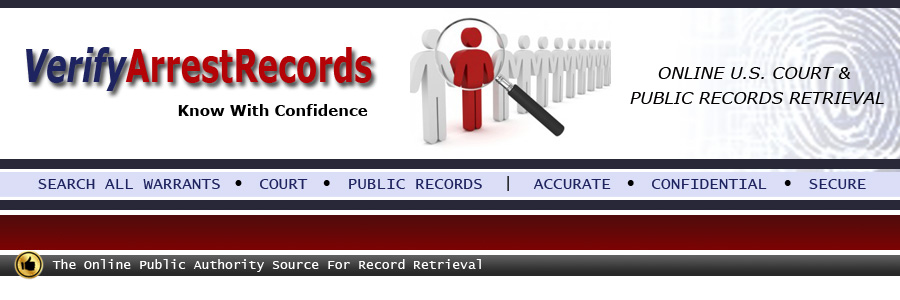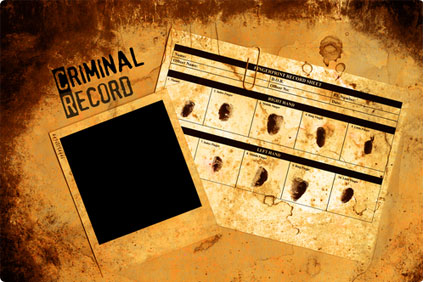
Types of Records
There are many different classes of records in the U.S. legal system that document criminal activity. State and federal records exist to track criminal activity, keep the public informed, control crime nationwide, make sure laws are upheld and that citizens rights are respected. For these reasons criminal records are essential to a just society. The types of criminal records you will find from conducting a search on our site will provide you with such information as arrest records, court records, sentencing records, probation records, outstanding warrants, prison records, inmate records, and more and go back to a 20-year history.
Misdemeanor and Felony Records
Most crimes are categorized as either felonies or misdemeanors. The criteria which determines what crimes fall into which category is largely based on the severity of the crime. In general, a crime is considered a felony if it's of a violent nature (murder, armed robbery, kidnapping, aggravated assault, etc). The sentencing to these crimes generally yields more than a year in jail and/or hefty fines. Convicted felons will often have rights revoked, such as the right to bear arms, the right to vote, and the right to serve in the military.
For misdemeanors, the period of imprisonment is usually less than a year since the crime is less serious in nature and usually non-violent. Examples of misdemeanors are indecent exposure, public intoxication, petty theft, breaking and entering, etc. If the offender was given probation or a monetary fine, that information would be found in the contents of the criminal record.
Arrest Records vs. Conviction Records
An arrest record is different from a conviction record in that an arrest record isn't proof that the person in question actually committed the crime. It just means you were arrested for suspicion. A conviction record means you were found guilty and sentenced or punished by the law. However, an arrest record may prompt questioning into your past conduct or actions and can have negative consequences even if you are found innocent.
Parole Violations
Parole is a release from prison before your sentence has been fully served. It cuts down your jail time and is granted on the basis of good behavior. Individuals serving a felony conviction may be eligible as long as the conditions of parole are met which will be clearly stated when you are allowed to leave incarceration. If you violate those conditions, you have violated your parole and risk additional jail time. Activity and behavior that could violate parole are:
Not checking in with your parole officer
Possessing drugs, alcohol or weapons
Failing a drug test
Not wearing your GPS monitor
Being near a school zone or playground (in cases of sex offenders)
Probation Violations
Probation can be assigned as an alternative to a jail sentence in certain crimes depending on the circumstances. Violating probation is taken seriously and can result in further punishment or restrictions including:
Your probation being revoked leading to a prison sentence
A longer probation period or increased probation punishments
Court ordered community service
Mandatory substance abuse treatment
Sex Offender Status
Megan's law, put into practice in 1996, requires that the national sex offender registry be available to the public so citizens can be advised of sexual predators around their neighborhoods and school systems. If you've been convicted of a sex crime such as rape, sexual assault, or child molestation you must register for life as a sex offender. Each registered sex offender is categorized as a level 1, 2, or 3 depending on the likelihood that the person will commit another sexual offense. States treat sex offender crimes with the utmost seriousness since many of the victims involved are children, women, and people who are incapable of defending themselves.
Inmate Prison and Release Records
If you've served any time in jail, for whatever reason, you have an inmate record. Your inmate and release record will list the crime you were imprisoned for, your behavior while incarcerated, the condition and terms of your release, and any additional offenses you've been convicted of. These records will be filed with your prison records and aid law enforcement agencies to keep criminal justice and background investigations as organized as possible.
Court Records
Any time you've gone to court, regardless of the situation, a court record will be documented in the system. Court records can contain everything from personal information, the details of the case, reason for the dispute, court dates, judgements, and any warrants or other records attached to the case. Most states handle non-criminal cases and less serious felonies at the local state level while, serious criminal cases are typically held in federal courts.
Civil court records generally don't involve criminal activity. In cases like these monetary damages are usually being sought. Civil court cases are relegated to civil action cases, small claims, eviction actions, court judgments and probate cases. Nonetheless, they do require a classified court record to be filed with the court system.
There are many different classes of records in the U.S. legal system that document criminal activity. State and federal records exist to track criminal activity, keep the public informed, control crime nationwide, make sure laws are upheld and that citizens rights are respected. For these reasons criminal records are essential to a just society. The types of criminal records you will find from conducting a search on our site will provide you with such information as arrest records, court records, sentencing records, probation records, outstanding warrants, prison records, inmate records, and more and go back to a 20-year history.
Misdemeanor and Felony Records
Most crimes are categorized as either felonies or misdemeanors. The criteria which determines what crimes fall into which category is largely based on the severity of the crime. In general, a crime is considered a felony if it's of a violent nature (murder, armed robbery, kidnapping, aggravated assault, etc). The sentencing to these crimes generally yields more than a year in jail and/or hefty fines. Convicted felons will often have rights revoked, such as the right to bear arms, the right to vote, and the right to serve in the military.
For misdemeanors, the period of imprisonment is usually less than a year since the crime is less serious in nature and usually non-violent. Examples of misdemeanors are indecent exposure, public intoxication, petty theft, breaking and entering, etc. If the offender was given probation or a monetary fine, that information would be found in the contents of the criminal record.
Arrest Records vs. Conviction Records
An arrest record is different from a conviction record in that an arrest record isn't proof that the person in question actually committed the crime. It just means you were arrested for suspicion. A conviction record means you were found guilty and sentenced or punished by the law. However, an arrest record may prompt questioning into your past conduct or actions and can have negative consequences even if you are found innocent.
Parole Violations
Parole is a release from prison before your sentence has been fully served. It cuts down your jail time and is granted on the basis of good behavior. Individuals serving a felony conviction may be eligible as long as the conditions of parole are met which will be clearly stated when you are allowed to leave incarceration. If you violate those conditions, you have violated your parole and risk additional jail time. Activity and behavior that could violate parole are:
Not checking in with your parole officer
Possessing drugs, alcohol or weapons
Failing a drug test
Not wearing your GPS monitor
Being near a school zone or playground (in cases of sex offenders)
Probation Violations
Probation can be assigned as an alternative to a jail sentence in certain crimes depending on the circumstances. Violating probation is taken seriously and can result in further punishment or restrictions including:
Your probation being revoked leading to a prison sentence
A longer probation period or increased probation punishments
Court ordered community service
Mandatory substance abuse treatment
Sex Offender Status
Megan's law, put into practice in 1996, requires that the national sex offender registry be available to the public so citizens can be advised of sexual predators around their neighborhoods and school systems. If you've been convicted of a sex crime such as rape, sexual assault, or child molestation you must register for life as a sex offender. Each registered sex offender is categorized as a level 1, 2, or 3 depending on the likelihood that the person will commit another sexual offense. States treat sex offender crimes with the utmost seriousness since many of the victims involved are children, women, and people who are incapable of defending themselves.
Inmate Prison and Release Records
If you've served any time in jail, for whatever reason, you have an inmate record. Your inmate and release record will list the crime you were imprisoned for, your behavior while incarcerated, the condition and terms of your release, and any additional offenses you've been convicted of. These records will be filed with your prison records and aid law enforcement agencies to keep criminal justice and background investigations as organized as possible.
Court Records
Any time you've gone to court, regardless of the situation, a court record will be documented in the system. Court records can contain everything from personal information, the details of the case, reason for the dispute, court dates, judgements, and any warrants or other records attached to the case. Most states handle non-criminal cases and less serious felonies at the local state level while, serious criminal cases are typically held in federal courts.
Civil court records generally don't involve criminal activity. In cases like these monetary damages are usually being sought. Civil court cases are relegated to civil action cases, small claims, eviction actions, court judgments and probate cases. Nonetheless, they do require a classified court record to be filed with the court system.



Most Common Types of Felonies
Murder
Aggravated Assault and/or Battery
Manslaughter
Child Pornography
Kidnapping
Violating Parole or Probation
Vehicular Homicide
Arson
Grand Larceny or Grand Theft
Burglary
Perjury
Tax Evasion
Manufacture, Sale, Distribution, or Possession with Intent to Distribute Illegal Drugs
Vandalism on Federal Property
Most Common Types of Misdemeanors
Petty Theft
Prostitution
Public Intoxication
Simple Assault
Disorderly Conduct
Trespassing
Vandalism
Reckless Driving
Possession of Marijuana
Murder
Aggravated Assault and/or Battery
Manslaughter
Child Pornography
Kidnapping
Violating Parole or Probation
Vehicular Homicide
Arson
Grand Larceny or Grand Theft
Burglary
Perjury
Tax Evasion
Manufacture, Sale, Distribution, or Possession with Intent to Distribute Illegal Drugs
Vandalism on Federal Property
Most Common Types of Misdemeanors
Petty Theft
Prostitution
Public Intoxication
Simple Assault
Disorderly Conduct
Trespassing
Vandalism
Reckless Driving
Possession of Marijuana
ęCopyright VerifyArrestRecords.org_LLC. All Rights Reserved. VerifyArrestRecords.org is not affiliated in anyway with any Federal or State government agencies. All trademarks on this website, whether registered or not, are the property of their respective owners. Please do your own due diligence to determine if the content is right for your individual purposes. The publisher, vendors and advertisers of this site are not liable for any damages or losses associated with its content or the information posted by the publisher, advertisers and vendors. If you have any questions related to this website, please send an email to support@verifyrecords.com and we will reply within 24 hours. Thank you for visiting www.verifyarrestrecords.org.
DISCLAIMER: This report is not legal advice. You need to do your own due diligence to determine if the content is right for your Individual purposes. The publisher of this report is not liable for any damages or losses associated with the content in this report.
DISCLAIMER: This report is not legal advice. You need to do your own due diligence to determine if the content is right for your Individual purposes. The publisher of this report is not liable for any damages or losses associated with the content in this report.